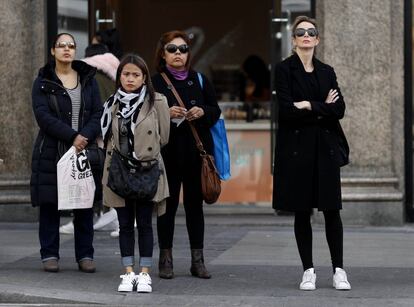A problem that affects us all
Discrimination and violence against women concern the whole of society

The fact that the female half of humanity continues to suffer discrimination because of gender, even in the most advanced countries, is not just an unacceptable injustice, but also a hindrance to social and economic progress. It is shameful that women still face serious difficulties accessing education and jobs. Despite the advances of recent years, we should not forget that even today, women make up two-thirds of the illiterate population in the world, or that the number of women in employment is persistently lower than that of men, even in the most advanced countries.
Despite the improvements in Spain due to legislation against gender-specific violence, there are danger signs
To waste the talent, training and ability of women is to squander social and economic resources for no other reason than maintaining an ancient status quo, the inertia of which seems to be proving a harder and more persistent obstacle than was previously believed. The proof is the difficulty with which we advance toward parity, both in the professional and working environments, as well as in terms of political representation, even in countries where legislation was passed long ago to try to achieve these goals. The salary gap remains a reality that means women earn 24% less than men on average for doing the same job, and that only one in five parliamentarians around the world are women.
We have known for some time that legislating against discrimination is necessary but not enough in itself to achieve parity. We have now seen how that process can even be set back. In the developed world, growing social inequality affects women particularly. The result is a feminization of poverty, which if not corrected will help perpetuate inequality.
In Spain and other countries hit by recession, women are emerging from the crisis under worse conditions than they went into it. Fewer women are working, unemployment is higher for them, and along with young people, their working conditions are worse than men’s, meaning they are employed in temporary positions and obliged to work fewer hours than they would choose. Given the importance of women’s employment and economic independence for the millennium goals, the UN’s 2030 sustainable development agenda lays special emphasis on policies to avoid labor discrimination.
To waste the talent, training and ability of women is to squander social and economic resources
And women also suffer a more harmful reality: physical and psychological violence. For example, the violence suffered by the 120 million women subjected to genital mutilation, or the 12 million girls and young women who are kidnapped and sold each year around the world to be exploited as sex slaves. To which should be added the millions of women who suffer violence at the hands of their partners.
Despite the improvements in Spain due to the passing of legislation against gender-specific violence, there are danger signs. The spike in the number of killings since the beginning of the year should prompt us to look for better ways to intervene to protect women.
In any event, neither violence nor discrimination in terms of political representation or in the labor market are problems that concern women alone, although they suffer the consequences directly. This is a problem that affects the whole of society.
English version by Nick Lyne.
Tu suscripción se está usando en otro dispositivo
¿Quieres añadir otro usuario a tu suscripción?
Si continúas leyendo en este dispositivo, no se podrá leer en el otro.
FlechaTu suscripción se está usando en otro dispositivo y solo puedes acceder a EL PAÍS desde un dispositivo a la vez.
Si quieres compartir tu cuenta, cambia tu suscripción a la modalidad Premium, así podrás añadir otro usuario. Cada uno accederá con su propia cuenta de email, lo que os permitirá personalizar vuestra experiencia en EL PAÍS.
¿Tienes una suscripción de empresa? Accede aquí para contratar más cuentas.
En el caso de no saber quién está usando tu cuenta, te recomendamos cambiar tu contraseña aquí.
Si decides continuar compartiendo tu cuenta, este mensaje se mostrará en tu dispositivo y en el de la otra persona que está usando tu cuenta de forma indefinida, afectando a tu experiencia de lectura. Puedes consultar aquí los términos y condiciones de la suscripción digital.








































